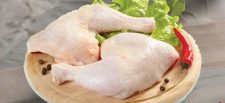Following the announcement by President Trump of a 10% tariff on all UK exports to the US, the National Farmers’ Union (NFU) and Agriculture and Horticulture Development Board (AHDB) have given comment.
The NFU has called the10% tariffs imposed on UK exports to the US, which come into force from Saturday 5th April, a “challenge for the UK and for agriculture”. The United States is the second largest market for British agri-food products after the EU, and according to the NFU, the reciprocal tariffs “may also result in products destined for the US market being redirected to the UK”, which could have a further negative impact.
“While the UK has been hit by a lower baseline tariff compared to the EU, this remains a challenge for the UK and for agriculture.”
NFU president Tom Bradshaw stated: “We have been working closely with the Government in the lead up to the announcements. While the UK has been hit by a lower baseline tariff compared to the EU, this remains a challenge for the UK and for agriculture, with the US being our second largest export market beyond the EU.
“While this is a developing and concerning situation, we are working in genuine partnership with the Government and sharing our expertise on this to ensure, if there is any market disruption in response to a change in the movement of goods and products between affected countries, we can respond swiftly.
“The United States is the largest market for British agri-food products outside of the European Union and our farmers are proud to supply high quality, authentic, and unique British meats and cheeses to American consumers.
“We stand united in our desire to work together to ensure British farmers and growers are at the forefront of any decision-making and will continue to work hand in glove with Government as the situation develops.”
AHDB analysis
In its initial analysis, AHDB concludes that the full impacts of the new tariffs will be difficult to predict until the reactions of other trading partners are known, but states that the tariffs, which include a 20% tariff for the EU and 54% for goods coming from China, will be “a major disruptor of global trade”.
“The new imposed tariffs will increase barriers to trade globally.”
Jess Corsair, AHDB senior economist, commented: “These announcements go against the World Trade Organisation (WTO), which aims to facilitate free, predictable, and smooth global trade. The new imposed tariffs will increase barriers to trade globally. The WTO also has the ‘most-favoured nation’ (MFN) principle, which means that countries cannot discriminate between their trading partners, so all members are treated equally when it comes to trade. This principle has been ignored as the US has implemented different tariffs on different countries.
“Currently the UK has access to the US ‘rest of the world’ quota for beef exports. This quota was filled by 17th January in 2025, and then any beef exports are subject to tariffs of 26.4%. It is unclear whether the new 10% tariffs will be additional to the current 26.4% tariff. Additionally, it is unclear whether the 10% tariff will be additional to those countries who already have Free Trade Agreements in place.
“Further clarification is needed regarding the how these tariffs will be implemented alongside current FTAs, quotas, and agreements. AHDB will be monitoring this and doing more in-depth analysis on the implication of the tariffs on global trade and the economy.”
The main agricultural exporters to the US are Canada, Mexico, the EU, Australia, and New Zealand. The US imported £7 billion of beef, £1.2 billion of pork, £1.14 billion sheep meat, and £1.4 billion of cheese (2022-24 three-year average).
The UK exports to the US include (three-year average 2022-2024):
- £2.9 million of fresh and frozen beef.
- £23 million of pork.
- £68 million of cheese.









